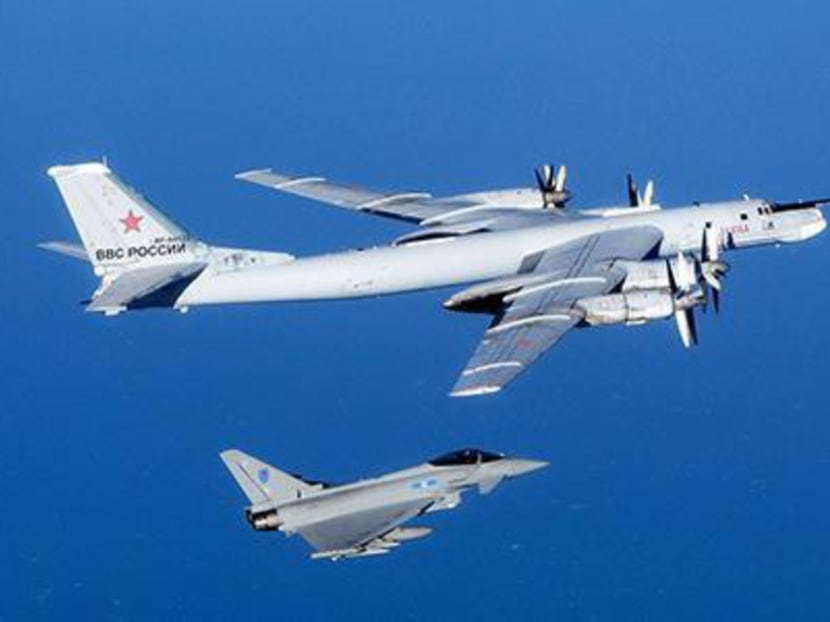UK summons Russian ambassador after bombers disrupt commercial flights
LONDON — Britain has summoned the Russian ambassador and asked him to explain why two Russian long-range bombers had flown over the English Channel this week, forcing the British authorities to scramble fighter jets to intercept them and reroute civil aircraft.

A British fighter intercepting a Russian Tu-95 bomber as it flew across one of the busiest civilian flight paths in Europe. Photo: Royal Air Force
LONDON — Britain has summoned the Russian ambassador and asked him to explain why two Russian long-range bombers had flown over the English Channel this week, forcing the British authorities to scramble fighter jets to intercept them and reroute civil aircraft.
The incident is the latest increasingly tense brush with Russian aircraft in the skies above Britain and other North Atlantic Treaty Organization (NATO) countries. It was also one of the most serious around British airspace so far, said British officials.
The two huge Russian Tu-95 bombers, known by fighter pilots as bears, flew across one of the busiest civilian flightpaths in Europe and had their transponders turned off, meaning that they could only be detected by radar and would have been invisible on regular air traffic control systems.
The United Kingdom air traffic controller, NATS, was forced to re-route commercial flights as a result. The decision was a precautionary measure, said a government official.
The bombers — whose distinctive outline once made them one of the most recognisable symbols of the Cold War — were initially intercepted by Norwegian fighters after taking off from Russia. They flew south from Norway over the North Sea towards UK airspace, continuing down the English Channel and then along France’s Atlantic coast.
The UK Foreign Office said it had summoned Russian Ambassador Alexander Yakovenko on Thursday to account for the incident the day before, saying the episode was part of an increasing pattern of “out of area operations” by Russian aircraft.
“The Russian planes caused disruption to civil aviation. That is why we summoned the Russian Ambassador to account for the incident,” it said in a statement.
Military officials and politicians across NATO have become increasingly concerned about Russia’s provocative aerial sorties.
An SAS civilian airliner taking off from Copenhagen in March narrowly avoided collision with a Russian spyplane south of Stockholm.
Moscow’s relationship with NATO has deteriorated after European nations imposed sanctions on Russia over its military involvement in eastern Ukraine and its annexation of Crimea last year.
NATO countries saw a threefold increase in provocative Russian activity in the skies last year. In Britain, Royal Air Force fighters had to be scrambled once a month on average since tensions with Moscow began to rise.
President Vladimir Putin reinstated long-range patrols of nuclear-capable bombers in 2007 and has significantly increased the regularity and scale of their manoeuvres of late.
Sculpting an adequate new doctrine of deterrence to try to combat Russian adventurism has become one of the top priorities for many NATO member states after the Ukraine crisis.
Amid shrinking government budgets across Europe, however, the appetite for increased spending on defence, or even more frequent use of existing defence assets, has remained limited.
Yesterday, the chief of Russia’s armed forces said that a strong nuclear arsenal will ensure military superiority over the West as Russia seeks to fulfil a multibillion dollar plan to modernise its forces by 2020.
Despite deep economic woes, General Valery Gerasimov said Russian armed forces would receive more than 50 new intercontinental nuclear missiles this year.
“Support for our strategic nuclear forces to ensure their high military capability combined with ... growth of the military potential of the general forces will assure that (the United States and NATO) do not gain military superiority over our country,” said General Gerasimov. AGENCIES






